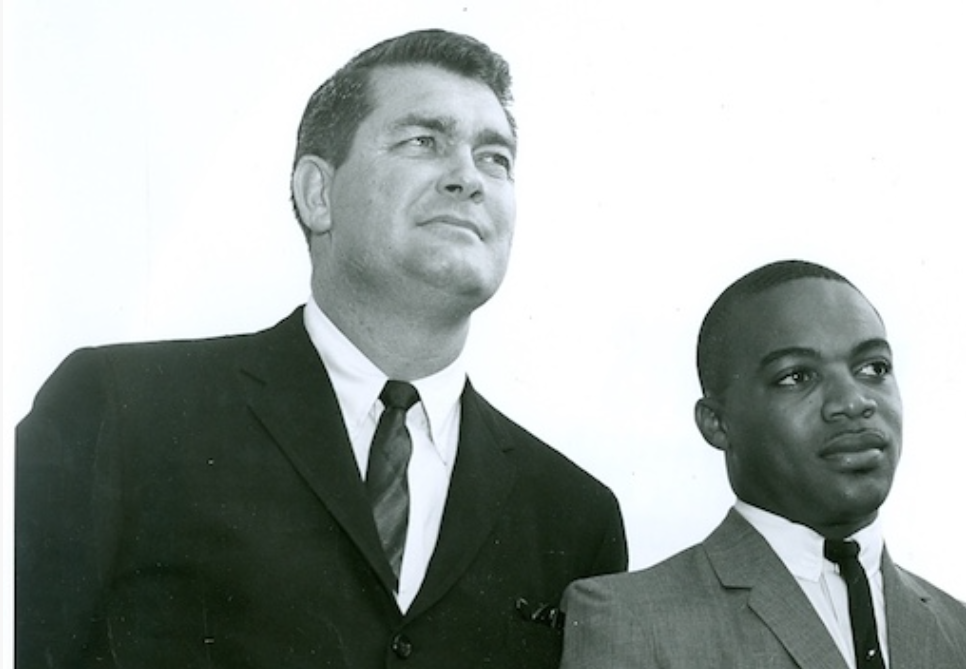A Life Well-Lived is Always About People
As America addresses social civility and race relations and reaffirm the importance of treating all people with dignity and respect, an achievement shared by long-time University of Iowa football Coach Hayden Fry is particularly pertinent.
Coach Fry, who passed last December at age 90, was my first interview in authoring Chuck Long’s biography “Destined for Greatness” (published November 2017).
I was nervous in the weeks leading up to interviewing the beloved coach (Dec. 12, 2015). Prior to our telephone conversation, I was told I’d have around 45 minutes (max) to converse with Hayden. That was reasonable and understandable, given Coach was just shy of his 86th birthday and a 20-plus-year cancer survivor… while still making time to correspond with Hawkeyes’ faithful from around the country wanting a word or signature from Iowa football’s winningest coach (Kirk Ferentz, a Hayden hire in 1981, now holds the mark for most wins as head coach).
But from the very moment the coach picked up the phone and accepted my call from his home in Ft. Worth, Texas, it was relaxed and comfortable – and went an hour-and-half.
He spoke to me as though we were life-long friends. Soon came to understand that was Hayden’s way – one of ten thousand reasons he was so beloved by Hawkeyes’ fans… and every college football fan. It didn’t matter who you were or what you wanted – Hayden always delighted in telling stories, remembering his years as a coach and as a Hawkeye and sharing experiences, occasions and jokes.
But the topic he dwelled on the longest during our conversation was in response to the question I looked forward to asking the most.
Hayden Fry and Jerry LeVias.
“Coach Fry, in recalling the decades you devoted to football as both a player and coach, what is your greatest accomplishment?”
Coach Fry answered without hesitation and with just two words: “Jerry LeVias.”
“Jerry LeVias?” I replied with yet another question.
“Jerry LeVias,” Coach Fry repeated, his words filled with pride and empathy.
“Tell me about Jerry,” I encouraged.
Without missing a beat, Hayden immediately turned back he clock to 1962 and his arrival at Southern Methodist University (ironically, his first game at the helm of the Mustangs was also a loss… against Michigan State University coached by Bump Elliott – Hayden’s eventual boss at the University of Iowa).
Upon taking the job at SMU, Hayden was promised by school administrators that he would have the opportunity to recruit black athletes to play Southwest Conference football.
It was more than a promise. It was the reason Coach Fry left Arkansas to coach the Mustangs.
“And that student athlete was Jerry LeVias,” Hayden said. “He was about 5-foot-nine and maybe 160 pounds, considered too small by a lot of other schools who passed offering him a scholarship.
“But he could do it all. He played running back, quarterback, wide receiver, returned punts and kickoffs – he could play a lot of different positions, just one of the intangibles that made him so special.”
Yet for all his athletic gifts, Hayden said, Jerry was an even better person and student.
“We knew we had a special opportunity to recruit the first black scholarship athlete to take the field for SMU and the Southwest Conference,” Hayden said. “That was pressure. But more importantly, it was a privilege. There was no doubt that Jerry was going to be an ambassador, role model and winner on and off the field.
“Indeed, that was Jerry LeVias.”
SMU hadn’t experienced a winning season for quite a while upon Hayden’s arrival, the coach recalled.
“But there was no doubt in my mind that we were going to change that… and there was no doubt that Jerry LeVias was going to play a big part of the turn-around.
“To make a long story short, we won the Southwest Conference championship Jerry’s sophomore year and he was right up there in the top-10, if not top five in the nation in pass receiving, number of passes caught, touchdowns, punt returns, kick returns and an All-American academically.
“You name it, Jerry achieved it,” Hayden said, his voice booming over the line as though he was speaking real-time to reporter seconds after clinching a conference championship.
Jerry’s talent and poise – on and off the field – “opened the door for all of the fine black athletes who had been leaving Texas and going to the Pacific Coast or the Big Ten, going somewhere else where they could play,” Hayden said. “People make the difference in a program. And there was no one better than Jerry LeVias.”
By offering Jerry a scholarship, “We opened the door for the recruitment of black players in the state of Texas. It doesn’t get much better than that.”
What Hayden didn’t mention during our conversation was the hate mail and threatening phone calls he received upon recruiting and playing Jerry.
Hayden Fry accepts cheers of gratitude from Hawkeyes’ faithful upon a return visit to Kinnick Stadium. Hayden amassed a 232-178-10 record while at the University of Iowa along with six college football bowl wins.
Those who know admit Hayden downplayed the treatment and threats he received because Jerry, they added, endured far greater.
Hayden’s focus was always on the person, his character and abilities. That’s what mattered. That’s what should always matter.
“He’s lived an unbelievable life helping other people. He’s like one of my sons,” Hayden said before our call concluded on that cool, Saturday afternoon in December 2015.
“We were just two people playing football and seeing the best in each other and every situation. We’ve had a wonderful relationship through the years and we’ve been great friends. And every couple of weeks to this day, Jerry calls me on the phone and we just visit.”
People. Relationships. Character. Friendships. Achieving shared goals. Those are the things that matter. Those are the attributes that endure.
Little wonder Hayden dwelled so emphatically on sharing the story of Jerry LeVias. Because it was indeed the most important accomplishment in his career – and a story we can all take to heart — in 2020 and any year.
God bless Coach Hayden Fry.
(Enjoy this story and many others in “Destined for Greatness – The Story of Chuck Long & Resurgence of Iowa Hawkeyes’ Football” available on Amazon, Kindle and Audible)
Aaron Putze presents a copy of the Chuck Long biography he authored to Hayden Fry during a visit to Hayden’s residence in the Dallas-Ft. Worth area April 2018.



